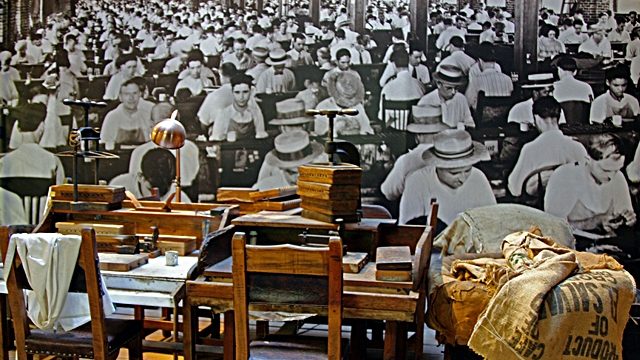FDA rules could kill 119-year-old family cigar business

GOING, GOING …. : Cigar City, as the Ybor City area of Tampa, Fla., is known, could see its last cigar maker forced out of business if an FDA rule is implemented. Ybor city was founded in 1886 by Vincente Martinez Ybor.
By William Patrick | Florida Watchdog
TALLAHASSEE, Fla. — J.C. Newman Cigar Co. is one of a kind, literally.
Founded in 1895 by Julius Caesar Newman, a Hungarian immigrant, the Tampa-based family business is the last of what was once 150 “Cigar City” factories.
The business has outlasted 19 U.S. presidents, two world wars, a Cuban economic embargo that crushed many of its competitors and, most recently, the Great Recession.
Now, the company is fighting for its life.
A new executive branch regulation aimed at curbing youth access to tobacco by stomping out affordable cigars effectively would extinguish the Newman family legacy, and its 130 jobs.
“It’s totally unfair the way the U.S. Food and Drug Administration is approaching us,” Eric Newman, the cigar company’s president, told Watchdog.org.
“Cigars are to Tampa what wine is to Napa Valley and what automobiles are to Michigan,” he said.
“If you know anyone whose family has been in Tampa for three or four generations, chances are someone was working in the cigar industry because they were the only jobs around.”
The company’s success is in no small part due to its market niche.
J.C. Newman’s, known locally by its signature clock tower, El Reloj, uses 1930s vintage equipment to roll cigars that sell for $10 or less. They’re an affordable luxury, however, that does not qualify for a “premium cigar” regulatory exemption.
Despite the quality of tobacco and the factory’s traditional methods, the company’s cigars are simply too inexpensive for government approval, and its machines don’t meet the technical definition of producing a handmade product.
“Not everyone has $10 or more to spend on a cigar,” Newman said. “It takes us four months to teach a cigar maker how to use our hand-operated machines. We’re making cigars the same way my grandfather made them after in the 1930s.”
In 2009, a Democratic-controlled Congress gave the FDA the power to regulate the tobacco industry. After first cracking down on cigarettes and smokeless tobacco, federal regulators now are moving on e-cigarettes, pipe and hookah tobacco, and cigars.
The problem, Newman said, is that treating cigars as if they’re cigarettes is a one-size-fits-all approach that doesn’t make much sense.
“I don’t blame them,” said Newman. “They’re job is to regulate youth access to tobacco, and it’s our job to explain to them how totally unfair it would be to regulate our industry the same way they regulate cigarettes. It’s apples and oranges.”
In April, a 67-page proposed rule was published in the federal registry. When finalized, it will require J.C. Newman Cigar Co. to:
- Obtain federal approval before offering any new cigar product.
- Submit every type of cigar sold to “rigorous scientific review.”
- Comply with new manufacturing practices.
The company also would be required to pay a user fee in the hundreds of thousands of dollars, effectively paying the FDA to regulate it.
“This is an important moment for consumer protection — when the proposed regulation is finalized, FDA will be able to apply powerful regulatory tools, such as age restrictions and rigorous scientific review of new tobacco products and claims, to help reduce tobacco-related disease and death,” Mitch Zeller, J.D., director of the FDA’s Center for Tobacco Products, said in a statement.
“Ultimately, FDA will play a vital gatekeeping role in protecting the public by reviewing all new products and health-related claims for tobacco products in today’s rapidly evolving marketplace.”
The gatekeeping role includes requiring cigar manufacturers to spend thousands of hours, according to an FDA analysis, to test new products before submitting an application to sell a single new brand or size of cigar. New packaging on an existing cigar also would require FDA approval, and the tightened manufacturing practices could prohibit J.C. Newman’s vintage equipment.
“The worst case scenario is that the regulators will prevent new products from entering the marketplace,” said Newman. “Eighty percent of what we sell today we didn’t 10 years ago. New products are the key to every business in the country.”
Many of J.C. Newman’s employees come from one-time competitors that are no longer in business. If the El Reloj facility goes under, there is no other factory in Tampa where cigar makers will be able to apply their skills.
Newman told Watchdog.org that he’ll continue to advocate for a premium exemption. The FDA also is receiving public comment about its proposed rule until Aug. 8. As of Wednesday morning, 37,943 comments have been submitted.
Newman said he recently met with FDA officials and showed them two cigars: one produced at his Tampa factory and a potentially exempted hand rolled premium cigar. The regulators couldn’t tell the difference, he said.
Contact William Patrick at wpatrick@watchdog.org







